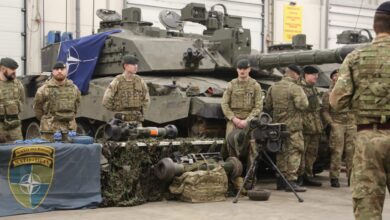Historic NATO summit overshadowed by questions about aging host
Unlock the free US Election Countdown newsletter
The big stories about money and politics in the race for the White House
Joe Biden’s closest Western allies will leave Washington uncertain about the US commitment to NATO beyond January, after an alliance summit overshadowed by questions about whether the US president can continue his re-election battle with Donald Trump.
The White House hopes the 75th anniversary meeting will be a show of alliance unity and determined to fight against RussiaBut the volatile domestic political situation in the United States and Trump’s continued ambivalence about Washington’s commitment to the alliance’s common security principles have contributed to a sense of intense unease.
Much of the talk throughout the week, whether in the vast convention center where leaders gathered, at formal receptions across the U.S. capital or at after-hours gatherings at bars and embassies, focused on how Biden performed at the summit — and what his future holds.
As the summit drew to a close on Thursday night, Biden mistakenly referred to Ukrainian President Volodymyr Zelenskyy as Russian President Vladimir Putin. He quickly corrected himself, but the incident only added to the tension and left everyone in the room gasping.
“Now I want to turn it over to the president of Ukraine, who has the courage and the determination, ladies and gentlemen, President Putin,” Biden said, before quickly adding: “President Putin, he will defeat President Putin — President Zelenskyy.”
Viktor Orbán, the Hungarian prime minister, left the summit on Thursday to meet Trump in Floridatold other leaders at a formal dinner at the White House on Wednesday that NATO allies who still think Biden can win are “like the people on the Titanic who played violins as the ship sank,” according to people briefed on his private remarks.
Others were quick to dismiss such pessimism. Biden was “fully present” throughout the summit, people who witnessed his official engagements said, and did not appear distracted by the political storm outside the NATO bubble or fatigue, as he did during the debate two weeks ago that marred his performance. re-election opportunity.
“The focus here is really on substance,” Biden’s national security adviser Jake Sullivan stressed. “It’s about what we’re trying to do in terms of protecting the alliance and doing for Ukraine and doing in terms of our partnership with the Indo-Pacific. It’s not about politics.”

But his acumen and clarity at the White House dinner on Wednesday night was the main topic of discussion among delegations the next day, underscoring the widespread anxiety within the NATO Alliance allies about whether he can continue to campaign — and ultimately win.
Dozens of world leaders and their advisers held their breath at the opening ceremony on Tuesday, where Biden surprised outgoing NATO Secretary General Jens Stoltenberg by presenting the United States with its highest civilian honor, the Presidential Medal of Freedom.
After reading a eulogy from a teleprompter to Stoltenberg, Biden turned to the tall Norwegian to place the medal around his neck. A person in the room said attendees could hear a pin drop as the invited guests gathered to see if the president could complete the task.

Other attendees of Tuesday’s opening session said Biden delivered strong remarks after the cameras left the room. Biden’s real test will be his closing news conference on Thursday, where he expected to answer questions straight from the journalists.
“He was very healthy and energetic in the room today,” said a person present at the closed-door summit on Wednesday. “But being able to read prepared remarks from a piece of paper is a low bar for a president of the United States.”
NATO allies have remained steadfast in not making any public comments regarding Biden’s health for fear of interfering in the November election or alienating a key ally.
But the silence has masked deep anxiety among European allies about the election, given Trump’s anti-NATO stance and the importance of US security commitments to European capitals.
At a rally in Florida on Tuesday as Biden opened the summit, Trump criticized the alliance, saying he was threatening world leaders who failed to honor their defense commitments that the United States might not defend them against future Russian attacks. Article 5 of NATO’s founding North Atlantic Treaty requires allies to consider an attack on any member as an attack on all.
In public, attendees repeatedly dodged reporters’ questions about Biden’s mental state or leadership abilities.
“I am not distracted,” Finnish Foreign Minister Elina Valtonen told the Financial Times when asked if Biden’s challenges would derail the historic meeting. “I am only concerned about the impact I can have… both NATO and the United States will survive whatever decision is made.”
Additional reporting by James Politi in Washington




